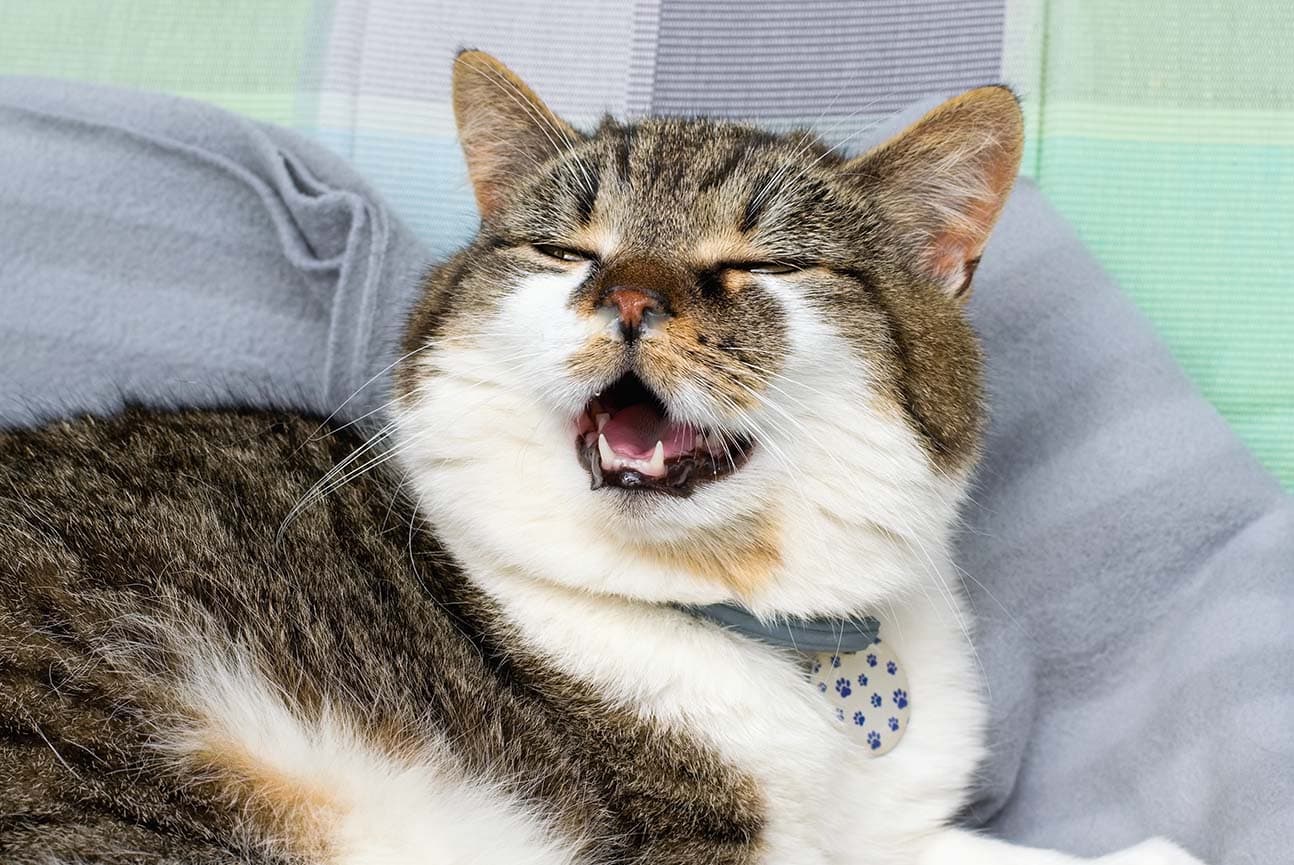Reviewed by Dr. Laura Castillo
Updated on 20/11/2025
Reading time 4 min.
Overview
Severity: Low
Life stage: All
Bad breath in cats, also known as ‘halitosis’, can affect cats of any age or breed, turning cosy cuddles into less-than-pleasant experiences! More importantly, persistent bad breath often signals dental disease or other underlying health issues. With over 80% of cats developing dental disease in their lifetime, it’s a problem no owner should overlook.
Dubai’s environment creates unique challenges for feline oral health. Air conditioning reduces natural saliva flow, allowing bacteria to thrive, while dust and sand irritate the mouth. Indoor apartment living limits natural teeth-cleaning behaviours. Regular dental hygiene and checkups are especially important here, as environmental stressors can accelerate dental disease.
What to do if your cat has bad breath
Begin with a careful at-home examination to identify the potential cause.
Check your cat’s teeth and gums (if safe to do so):
- Healthy teeth appear white and clean without discolouration
- Look for brown staining at the gum line, indicating decay or tartar buildup
- Watch for hard deposits coating or burying teeth
- Ensure teeth aren’t loose, wobbly, or broken
- Healthy gums are pink. Red, swollen, or bleeding gums indicate problems
- 50-90% of cats over 4 years have some dental disease
Examine your cat’s mouth (only if tolerated):
- Persian and flat-faced breeds popular in Dubai are prone to food entrapment between overcrowded teeth
- Check for foreign particles, especially fine sand or dust
- Look for signs of oral pain or reluctance to allow examination
Inspect lips and surrounding areas:
- Red, inflamed skin around the mouth contributes to unpleasant odours
- Check for infections, particularly relevant in Dubai’s humid conditions, where bacteria develop rapidly
Common causes of bad breath in cats
Bacterial infection and dental decay are primary causes, with Dubai’s environment adding additional concerns.
Dental and oral causes:
- Tooth and gum disease (periodontal disease)
- Bacterial buildup and tartar formation
- Mouth tumours or growths
- Food particles trapped between teeth (especially flat-faced breeds)
Systemic health issues:
- Kidney disease, liver disease, or diabetes
- These conditions may develop more rapidly due to heat stress and dehydration
Dietary factors:
- High fish oil content in the diet or supplements
- Poor-quality food lacking essential nutrients
- Inappropriate human food treats
Environmental factors specific to Dubai:
- Air conditioning reduces saliva production (the body’s natural mouth cleanser)
- Dust and sand particles contribute to oral irritation
- Variations in water quality affect overall oral health
- Stress from temperature fluctuations between indoor and outdoor environments
When to worry about bad breath
Bad breath can signal serious oral health problems or systemic illness requiring immediate attention.
Seek veterinary care immediately if:
- Bad breath accompanies other severe symptoms, such as weakness, breathing difficulties, complete loss of appetite, and collapse.
Seek prompt veterinary help if your cat shows:
Facial and eating indicators, such as:
- Pawing or rubbing at the face persistently
- Gagging, retching, or difficulty swallowing
- Eating only on one side of the mouth
- Drooling excessively
- Refusing dry food
- Facial swelling on one or both sides
Systemic symptoms, such as:
- Changes in eating or drinking habits (particularly concerning in Dubai’s heat)
- Weight loss
- Increased lethargy, less play, or hiding behaviour
- Vomiting or diarrhoea
- Changes in litter tray habits
In Dubai’s climate, these symptoms may develop more rapidly due to dehydration and heat stress.
How to prevent bad breath in cats
Daily dental hygiene:
- Brush your cat’s teeth daily using feline-specific toothpaste
- Use pet-safe mouthwash or dental gels if brushing proves impossible
- Microfibre tooth-cleaning cloths offer alternatives for resistant cats
Dietary management:
- Feed a balanced, high-quality diet appropriate for your cat’s age
- Avoid human treats that promote bacterial growth
- Consider prescription dental diets promoting plaque-free mouths
- Offer appropriate dental chews designed for feline oral health
Environmental care specific to Dubai:
- Provide constant access to fresh, filtered water
- Monitor water intake closely during hot weather
- Maintain a consistent indoor temperature to reduce environmental stress
- Keep feeding areas clean and dust-free
Health monitoring:
- Check your cat’s weight and overall health regularly
- Schedule routine veterinary examinations every six months
- Monitor eating habits and behaviour for subtle changes
Things to look out for
Watch for these warning signs beyond obvious bad breath:
Signs of oral discomfort:
- Non-compliance during mouth examination
- Behavioural changes: increased irritability, withdrawal, hiding
- Preference for soft foods over dry kibble
- Dropping food whilst eating or difficulty chewing
- Excessive pawing at the mouth or face
How to treat the causes of bad breath at home
Bad breath should be investigated by your vet, but you can take steps at home to keep your pet comfortable before and after the visit.
Dubai-specific considerations:
- Ensure consistent access to fresh filtered water
- Monitor and encourage water intake
- Protect your cat from dusty environments during sandstorms
- Maintain stable indoor temperatures
- Provide indoor exercise during extreme heat
Ongoing care:
- Establish a consistent daily dental care routine
- Schedule regular health monitoring and weight checks
- Provide environmental enrichment to reduce stress
- Book 6-monthly dental check-ups with your vet
How vets treat bad breath in cats
Treatment depends on finding the underlying cause, and your vet will tailor a plan based on your pet’s specific needs.
Diagnostic procedures:
- Comprehensive oral examination, potentially under sedation
- Dental X-rays to assess tooth roots and surrounding bone
- Blood tests and urine analysis to investigate organ function
- Biopsy of unusual growths or tissue changes
- Advanced imaging for complex cases
Treatment options:
- Professional dental cleaning and scaling under general anaesthesia
- Surgical extraction of severely diseased teeth
- Antibiotics for bacterial infections
- Treatment of underlying systemic conditions
- Specialist referrals when appropriate
Cats at higher risk of developing bad breath
High-risk categories:
- Older cats and those with poor kittenhood nutrition
- Persian and flat-faced breeds: prone to overcrowded teeth
- Cats fed exclusively on poor-quality diets
- Indoor cats with limited natural teeth-cleaning opportunities
Dubai-specific risk factors:
- Cats experiencing frequent temperature changes
- Cats with limited access to fresh water
- Cats exposed to dusty conditions during sandstorms
- Cats with weakened immune systems due to environmental stress
- Multi-pet households competing for resources
Worried about your cat’s bad breath? Book a checkup or emergency appointment today at Modern Vet Hospital in Dubai. Their experienced team offers advanced diagnostic services, professional dental care, and ongoing treatment tailored to your cat’s needs. From routine dental check-ups to urgent care for underlying health problems, Modern Vet Hospital is your trusted veterinary clinic in Dubai for expert, compassionate feline care.
Share this, choose your platform!
Reviewed by
Dr. Laura Castillo
DVM
Dr. Laura was born and raised in México. As far back as she can remember, she only had one dream and it was a dream of one day becoming a veterinarian.


